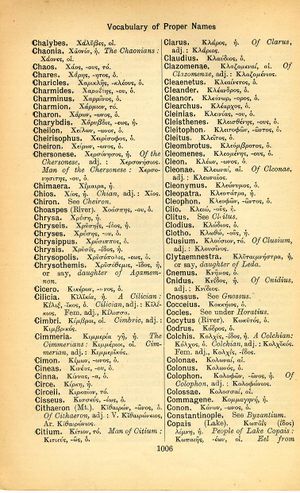Cnidus: Difference between revisions
ὁ γὰρ ἀποθανὼν δεδικαίωται ἀπὸ τῆς ἁμαρτίας → anyone who has died has been set free from sin, the person who has died has been freed from sin, someone who has died has been freed from sin (Romans 6:7)
m (Text replacement - "link={{" to "link={{") |
m (Text replacement - "}}]]" to "}}]]") |
||
| Line 1: | Line 1: | ||
{{WoodhouseENELnames | {{WoodhouseENELnames | ||
|Text=[[File:woodhouse_1006.jpg|thumb | |Text=[[File:woodhouse_1006.jpg|thumb | ||
|link={{filepath:woodhouse_1006.jpg | |link={{filepath:woodhouse_1006.jpg}}]]Κνίδος, ἡ. | ||
<b class="b2">Of Cnidius</b>, adj.: [[Κνίδιος]]. | <b class="b2">Of Cnidius</b>, adj.: [[Κνίδιος]]. | ||
Revision as of 10:11, 15 August 2017
English > Greek (Woodhouse)
Κνίδος, ἡ.
Of Cnidius, adj.: Κνίδιος.
Latin > French (Gaffiot 2016)
Cnĭdus,¹³ Cic. Pomp. 33 ou Gnĭdus, ī, Catul. 36, 13, f., Gnide [ville de Carie où Vénus avait un temple].
Latin > German (Georges)
Cnidus u. -os od. Gnidus u. -os, ī, f. (Κνίδος), Seestadt an dem Vorgebirge Triopion (in Karien), auf einer Halbinsel, berühmt durch Handel u. den Kultus der Venus u. deren herrliche, im dortigen Tempel befindliche Marmorstatue, das Meisterstück des Praxiteles, j. Cnido, Mela 1. § 84. Liv. 37, 16, 2. Cic. de imp. Pomp. 33: als Sitz der Venus, o Venus, regina Gnidi Paphique, Hor. carm. 1, 30, 1: G. piscosa, Ov. met. 10, 531: G. arundinosa, Catull. 36, 13. – Dav. Cnidius (Gnidius), a, um (Κνίδιος), knidisch, Venus, Plin.: calami, Plin.: granum, coccum, knidische Körner, d.i. Samen von Seidelbast ( Daphne Mezereum, L.), Cels. u. Plin.: Plur. subst. Cnidiī, ōrum, m. (Κνίδιοι), die Einw. von Knidos, die Knidier, Cic. u.a.

